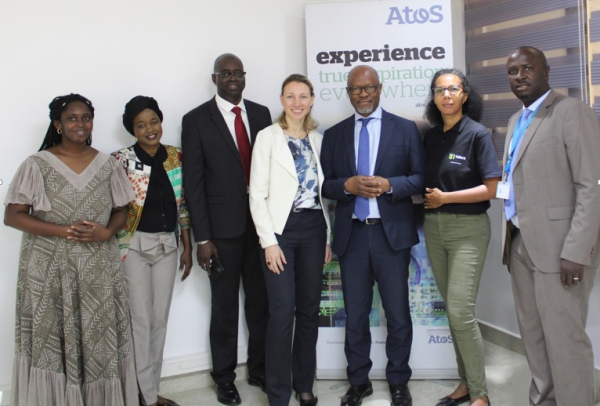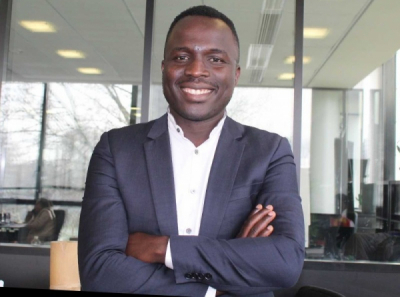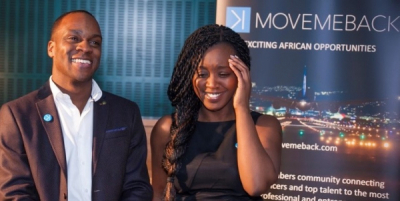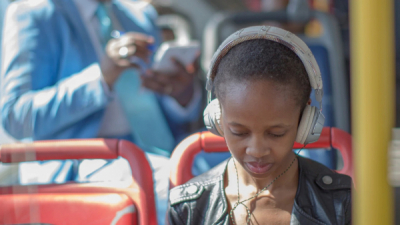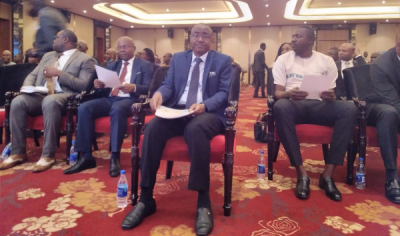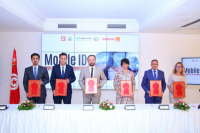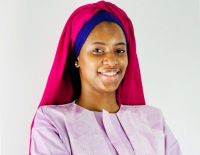The center will help boost access to quality digital education and offer employment opportunities and innovative solutions in Senegal.
IT company Atos and 01Talent Africa launched Monday (July 4) a collective intelligence center in Dakar, Senegal. The center will offer digital training, starting from September 2022.
During the launching ceremony, Alpha Barry, Head of Atos Africa, elaborated on why Africa is the perfect continent to develop the collective intelligence center project. “With an average age of 19, Africa is the youngest continent in the world and will represent 40% of the world's population by the end of the century. By working with 01Talent in Africa, we are giving these young people the opportunity to unleash their creative potential to contribute to the innovation and digital transformation of the continent," he indicated.
“This initiative is part of a strategic partnership that aims to accelerate the digital transformation in Africa, by enabling the massification of world-class digital skills through an innovative and inclusive training of excellence on the continent,” the two partners inform.
For 01Talent Africa’s strategic director, Karim Sy, “this strategic initiative confirms the commitment of 01Talent and Atos to the creation of an African technology ecosystem strengthened by the training of world-class talent, essential to the accomplishment of the continent's digital transition.”
“This is a huge opportunity to create jobs for young people and value for local businesses. Everyone becomes an actor of change,” he stresses.
The collective intelligence center baptized Zone01 will be inaugurated in September 2022, welcoming the first cohort of 120 young talents selected during a competitive stage. After Dakar, the two partners intend to launch a new Zone01 in Egypt, Morocco, and Mauritania.
Samira Njoya
Currently, in Africa, some SMEs still use inefficient expense management tools. In South Africa, Sava Africa wants to change that by introducing automated accounting tools.
Sava, also Known as Sava Africa, is a digital platform developed by South African startup SAVA Technologies Inc. It offers automated accounting tools that allow SMEs to improve expenditure management.
SAVA Technologies Inc. was founded, in 2021, by Yoeal Haile, Federico Von Bary Landesmann, and Kolawole Olajide. According to Kolawole Olajide, Sava “will help business owners manage their finances and solve some of the pain points they’ve faced from using disjointed financial software tools.”
For the time being, the platform has no mobile app. It is in its pre-launch phase and to access its features, notably virtual card issuance and budget/cash flow management, users currently have to join its waitlist. The fintech also offers quick credits with flexible repayment plans. Recently, it completed a US$2 million pre-seed round to develop new products. It plans to officially launch operations in South Africa in the third quarter of this year and enter the Kenyan and Nigerian markets later.
Adoni Conrad Quenum
He is well aware of the challenges faced by most students in their student visa application process since he was once in their shoes. Six years ago, he decided to contribute his professional experience to help overcome those challenges.
Duplex Eric Kamgang (photo) is a Cameroonian entrepreneur and co-founder of Studely, a consulting firm that facilitates visa applications for students applying for admission to European Universities. The consulting firm assists students in the obtention of proof of financial support, accommodation research, travel or home insurance, and bank account opening.
According to Eric Kamgang, Studely is the result of personal experience. “... In 2009, I got admitted to a major business school in Paris. At that time, I thought everything was ready for me to travel to France and fulfill my dream but I soon realized how wrong I was because applying for a visa turned out to be a long and painful journey. [...] Apart from showing how motivated I was, I also had to prove I had enough financial resources, find decent housing in France, and purchase compulsory insurance policies. I had to do all this within days and, having no assistance, I doggedly did as I could in my native country,” he recounts.
Studely currently claims assistance to 10,000 students from 65 countries for their visa applications in France and Germany. The consulting firm founded in 2015 is already present in 15 African countries. It earned its co-founder, Eric Kamgang, several recognitions and awards, including Meet Africa 2016 and Digital Africa 2017.
Let’s note that Eric has a master's in finance and accounting from the Catholic University of Central Africa and an MSc in Management from the Skema Business School, France. He started his professional career in 2007 as a financial auditor for BACA Consulting, Cameroon. In 2020, he joined Total as a financial controller before subsequent positions in the financial and energy sectors in Germany and France.
Melchior Koba
In Africa, startups offer a wide range of services and solutions to address the population’s needs. Movemeback wants to connect talented diaspora members to “high potential opportunities” in Africa.
Movemeback is a digital platform developed by UK incorporated company Movemeback Ltd. It connects members (namely leaders, influencers, and top talents) to high-impact social and entrepreneurial career opportunities.
For the time being, the platform has no mobile app. To join, users will have to visit its website, submit an application and wait for approval (subject to screening). Movemeback wants “to drive positive economic and social growth in Africa by providing an internationally trusted platform through which individuals, organizations and institutions across the world interact and partner with Africa.” For that purpose, it focuses notably on facilitating collaboration between its members.
Africa “has so much diversity, unmet and undiscovered need but even more interestingly untapped and uninitiated talent. The story is colorful, it’s multifaceted and through the process of the crowd, we intend to share it in high definition,” it explains.
In August 2020, Movemeback Ltd (incorporated in 2014), was among the 11 African startups to participate in “The Future is Female” mentorship program.
Adoni Conrad Quenum
In 2020, connectivity demand accelerated worldwide with the change in consumption habits induced by the coronavirus crisis. In many countries, the Internet is now considered a basic service, just like drinking water and electricity. Such transformations are leading to major changes in the African telecom market.
Mobile broadband will represent 78 percent of mobile subscriptions in the Sub-Saharan African region in the next five years, Ericsson reveals in its June 2022 Mobility Report. According to the Swedish multinational, those subscriptions will be mainly driven by 4G subscription uptake. In 2021, it explains, 4G subscriptions increased by 26 percent and are expected to grow further this year due notably to migration to 4G devices.
“3G mobile data traffic is still increasing, but the majority of traffic growth is expected to be in 4G,” the report reads. However, it should be noted that 3G will still account for the majority of mobile subscriptions in 2027, i.e. 40% compared to 28% for 4G. As for 5G, it will represent 10% of mobile Internet subscriptions in 2027.
In some markets such as South Africa and Kenya, where additional spectrum has recently been allocated, service providers have been able to expand the coverage and capacity of their 3G/4G networks, increasing mobile broadband subscriptions. Ericsson forecasts Sub-Saharan African average monthly data traffic per smartphone to reach 11 gigabytes by 2027 with the Covid-19 crisis-induced change in Internet consumption habits.
By that period, Africa will be the only global market where 2G networks will still be significantly present. The technology will account for nearly 20% of mobile subscriptions compared to an average of 7% in other continents.
Muriel Edjo
In Africa, the land management sector is confronted with several issues, from cumbersome administrative procedures to illegal documents. The Guinean government has decided to rely on technology for an efficient solution to problems affecting the efficiency of the national land leasing process.
The Guinean Ministry of Urban Affairs rolled out, Wednesday (June 29), habitatguinee.app, a land management platform. By rolling out the platform, the ministry wants to address the problems identified in the land management sector and help people (land lease applicants notably) easily complete administrative procedures.
According to Minister of Urban Affairs Ousmane Gaoual Diallo, the aim of the platform “is clearly to promote efficiency and secure the collection of government revenues by mitigating potential risks.”
During the roll-out ceremony, Prime Minister Mohamed Béavogui (photo, center) explained that a valid lease is required from citizens and investors alike for their construction or investment projects.
“The platform connects all the ministerial departments and institutions involved in the lease contract process in Guinea. It dematerializes the lease granting process and centralizes the already granted leases on a single platform,” explained Souleymane Diallo, a representative of Global High Tech, the Ministry of Urban Affairs’ partner in the development of habitatguinee.app.
Adoni Conrad Quenum
As digital transformation is increasing in Africa, governments are intensifying public service digitization. It is, therefore, necessary to guarantee digital trust. Hence digital identification measures are being taken by some countries.
The Tunisian Ministry of ICT signed Friday (July 1), a partnership agreement with the National Agency for Electronic Certification and telecom operators for the implementation of "mobile ID," a mobile identity project. The project concerned will transform sim cards into identity tools by linking users’ national identity card numbers to their phone numbers.
"This new service will reinforce digital trust in Tunisia by giving citizens a new secured and simple tool that allows them access to all the digital services and also provides them a digital signature,” explained ICT Minister Nizar Ben Neji.
Under the partnership agreement, telecom operators will verify users’ identities and link their phone numbers with their ID card numbers. The National Agency for Electronic Certification will issue personal identification numbers for every identified citizen. It will also generate personal QR Codes, which citizens can use to sign administrative documents online. The long-term goal is to allow Tunisians to connect to the public administration platform, log in with their identification numbers, request administrative documents, and sign them if need be online.
Mobile ID was announced in February 2021, in the framework of the government’s digital transformation program. According to the Ministry of ICT, it will rid the public administration system of the certified signature and certified copy requirements. In its initial phase, it will facilitate Tunisians’ access to the 120 administrative services already digitized. Then, it will gradually be rolled out to include the whole public administration.
Samira Njoya
The lab hosted by Orange Digital Center is an opportunity for project developers and companies to test the quality of their tech products and services. It will let them carry out small-scale tests before the launch.
Orange inaugurated, Thursday (June 30), its first African 5G Lab in Dakar, Senegal. The 5G Lab is dedicated to the experimentation and development of 5G-compliant products and services. The lab was ianuguared by Sékou Dramé, CEO of Sonatel Group, and Michaël Trabbia, Orange Chief Technology and Innovation Officer.
According to Michaël Trabbia, 5G is a tool that can be leveraged to boost companies' and nations’ growth. This is why Orange is committed to a co-innovation approach to help create futuristic products. "Territorial anchoring is key in the Orange 5G Lab program to support the digital transformation of economic players, and help everyone take advantage of the potential of the 5G," he said.
Orange 5G Lab Dakar is housed at the Orange Digital Center in Dakar in a 108 m² room with several sections that can be used as demonstration space for virtual reality and augmented reality services, a gaming space, or a co-working space. The space has case studies carried out in several areas (e-Health, smart port, smart édu, smart Agri) in partnership with technology providers Huawei and Nokia. It also has innovation demonstrations carried out by Caytu in partnership with the Dakar American University of Science and Technology (DAUST) and Senvital in partnership with Sonatel corporate medicine.
Orange 5G Lab Dakar is the 14th technology space of its kind to be inaugurated by the French telecom group in all its markets. Apart from Senegal, Orange has 5G Labs in France (10), Romania (1), Belgium (1), and Poland (1). More than 1,200 companies and local authorities have already benefited from the technology space, 114 of which have been able to experiment with their products and services.
In Senegal, the introduction of 5G combined with new technologies such as Big data, AI, and augmented reality aims to stimulate the transformation of the Senegalese society and economy in key areas such as agriculture, public health, education, entrepreneurship, and youth employability.
Ruben Tchounyabe
Since 2016, Cameroonian tech entrepreneur Vincent Onana Binyegui has multiplied actions to improve education access, in rural zones notably. The flagship product he developed, Teachmepad, allows access to educational content offline. The assembly plant is the next step in his project.
Teachmepad Mobile Limited, the developer of the solar-powered educational tablet Teachmepad, seeks €5 million to set up an assembly plant in Cameroon. For that purpose, it launched a pre-series A round last Friday, June 1. The capital sought will be divided as follows: €420,000 in equity crowdfunding and €4.573 million in loan crowdfunding. The pre-series A round will be closed on June 1, 2023, we learn.
The project has been reviewed by the national investment corporation SNI’s technical teams, revealed Teachmepad Mobile Limited founder Vincent Onana Binyegui at the end of a work session called by the Ministry of Economy.
The plant, dubbed Teachmepad Mobile Industry, will create 200 direct jobs, the founder stresses. In the framework of the project, Teachmepad Mobile Limited will acquire a unit, whose daily production capacity is 5,000, from China. In its first year of operation, the plant will operate at 20% of its capacity with 10 employees and progressively go at full throttle with a team of 205 people.
During the work session, SNI suggested the government should provide support to scale the project and make it bankable for additional technical and financial support. SNI also suggested a partnership with a technical partner, a mobile components manufacturer preferably, to guarantee the supply of needed components.
In 2021, Teachmepad Mobile Limited concluded a funding round launched in 2020 by raising about €1.219 million from Cameroonian and French investors. With the funds secured, it acquired a 5-hectare plot that will host the assembly plant, carried out 3D printing of the commercial prototypes, and performed some administrative tasks and the studies required for the plant installation project.
Teachmepad is an educative tablet that allows access to educational content, like Wikipedia, offline. It was developed to boost education in rural areas with poor internet and electricity access and a low number of teachers. The tablet has received the African Intellectual Property Organization (OAPI)’s patent.
Currently, Vincent Onana’s goal is to make TeachmePad the choice tablet in African countries for easy data collection, general census, and related works since the tablets can function in “remote areas with electricity and internet access problems.”
Ruben Tchounyabe
The young data scientist is convinced that the effective exploitation of available data can positively affect company growth. She wants to prove her point through her marketing agency.
Mama Diagana (photo) is a Mauritanian data scientist and entrepreneur. In 2020, she co-founded Neotic, a web, and mobile marketing agency. Her agency provides clients with solutions to improve their visibility. The services it offers notably include web/mobile development, web hosting graphic design, data analysis and visualization, predictive marketing, digital marketing, and video production.
“As a data scientist … I realized that vendors had unexploited data that could have helped them improve their productivity and sales as well as develop a more efficient strategy,” she explained in 2021 while revealing the reasons that prompted the creation of Neotic.
The young entrepreneur, who has been a journalist for Slice Up Mauritanie in 2018 and a freelance sales representative (from March 2019 to November 2021), believes that Neotic can greatly contribute to the development of trade and the economy in Mauritania. Some stakeholders believe so too. Indeed, in 2021, the marketing agency was one of the 2021 Emerging Mediterranean awardees, winning a US$5,000 grant and a ticket to the Emerging Valley Summit in Marseille, France. The same year, it participated in the Social and Inclusive Business Camp (SIBC).
Melchior Koba
More...
He has over twenty years of experience in the digital marketing industry. With his domestic service marketplace, he won the trust of thousands of clients and self-employed workers along with several awards and recognitions.
Ezana Raswork (photo) is an Ethiopian tech entrepreneur and founder of the digital marketplace Taskmoby. His marketplace currently connects home service providers (over 1000 registered on the platform) with clients (over 1500 jobs contracted through the platform) in Ethiopia.
The tech entrepreneur launched Taskmoby, in 2018, to help those who were previously unable to find qualified home service contractors for their various needs (plumbing, painting, electrical problems). Ezana is thriving in a domestic services market that is booming thanks to technology. However, Taskmoby is not his first venture. It is just a step in his professional and entrepreneurship career. He started his professional career in 1988 as a marketing manager for U.S consumer goods corporation Procter & Gamble. Twelve years later, he joined Canadian telephone service provider Fido Solutions as director of consumer marketing. From 2004 to 2007, he was the acting vice-president of marketing and vice-president of business development for the Canadian media company Yellow Pages. He was also the senior vice-president of Postmedia Network Inc., the publisher of Montreal Gazette, Ottawa Citizen, and Windsor Star.
In 2010, he founded Africa 118, a tech company providing digital marketing services to African SMEs. The company was perfectly aligned with his over 30 years of marketing experience. With Taskmoby, Ezana piqued the interest of several investment funds. In 2021, the startup was selected among the 50 beneficiaries of the Google for Start-up Black Founders Fund for Africa. Apart from the funds secured, making it to the list entitled Taskmoby to up to US$220,000 Google Cloud and Ads credit.
The services startup also won Ezana several awards, including the 2021 Eastern Africa Startup Awards. The startup was also selected by tech accelerator Baobab as the top Ethiopian company to watch in Africa and won the Best of Ecosystem Virtual Startup Pitch Series.
Melchior Koba
His professional experience, coupled with his background, helped him create a learning network that guarantees employment. The project has already earned international recognition.
Combine distance and face-to-face learning to allow access to quality and promising training for thousands of Africans. This is the feat achieved by Cameroonian Yanick Kemayou (photo), through Kabakoo Academies, the EdTech he co-founded in 2019 with Michèle Traoré.
Immediately after its creation, Kabakoo registered more than 12,000 learners. It is a network of learning institutions whose goal is to offset the shortcomings of conventional educational institutions that usually fail to equip students with the skills necessary to get decent jobs immediately after their courses.
“I decided to create that network because I was once the victim of the shortcomings of conventional educational institutions and the lack of opportunities in Cameroon,” explains Yanick Kemayou, a business administration Ph.D. holder.
Kabakoo’s pedagogical approach is designed to let learners develop digital fabrication and distributed manufacturing skills. The goal is not to develop state-of-the-art tech products and solutions for challenges faced by the immediate surrounding. It equips learners to either employ themselves or easily get a job after their courses.
Through its mobile app, Kabakoo allows access to several courses and mentoring from professionals working in prestigious companies like Google, Deloitte, Orange, and Oracle. The innovative learning model earned Kabakoo the "School of the Future" label, awarded by the World Economic Forum in Davos in December 2019.
Kabakoo is the result of its co-founder Yanick Kemayou’s professional and entrepreneurial experience. He started his professional career in 2008 as an assistant brand manager for L'Oréal in Düsseldorf, Germany. He later co-founded and managed the fashion company Clothing and Lifestyle Start-up, in Shanghai, China. Later on, he worked as a visiting scientist at HEC Paris, a research assistant, and a project manager at Paderborn University.
Melchior Koba
In 2021, Africa officially became a common market with numerous trade facilitation mechanisms. However, non-tariff barriers still pose challenges during financial transactions notably, therefore threatening the business inclusion sought after.
The African Continental Free Trade Area (AfCFTA) recently presented a project for the development of an e-payment platform dedicated to African SMEs. The project was presented by Wamkele Mene (photo, left), AfCFTA secretary general, during a meeting with Cameroonian Minister of Trade Luc Magloire Mbarga Atangana (photo, right) in Yaounde, last Monday (June 27).
According to Wamkele Mene, the end goal of the project is to create a digital marketplace to facilitate trade. For that purpose, the AfCFTA is negotiating with banks to secure guarantees because SMEs are usually confronted with credit access challenges. With those bank guarantees, SMEs can transact through the e-payment platform while banks cover the risks. Four sectors are targeted for the first phase of the project. They are notably agriculture, textile, transportation, and the pharmaceutical industry.
The AfCFTA is a key initiative in the African Union’s development blueprint Agenda 2063. It aims to accelerate intra-African trades and consolidate the continent’s commercial position in the global market. Currently, the area includes 44 member countries, including Cameroon.
S.A.
In the Ivorian language Bambara, Julaya means “trade”. It is now the name of a startup that facilitates payments. Currently, it claims hundreds of users in some regions.
Julaya is a digital platform developed by Franco-Ivorian startup Julaya SAS, founded in 2018, by Charles Talbot and Mathias Léopoldie. It allows users to make payments to mobile money and bank accounts right from one single platform.
The platform “allows our clients to facilitate their accounting. They, therefore, improve their operating efficiency by automating staff, daily expenditure, and supplier payments. Our solution is plug-and-play with no tech skill requirement. It can thus be used by financial departments, which are still poorly digitalized,” explains co-founderMathias Léopoldie.
Through its Android app, payments can be sent in record time. However, users will have to create a Julaya account and load it via partner banks, telecom operators, and fintech to access the feature. In Côte d’Ivoire and Senegal, Julaya accounts can be loaded via at least 10 banks.
According to Julaya SAS, over 300 directors of financial affairs and managing directors use the solution daily. In addition, the solution has processed more than 100,000 payments and salaries, helping save more than 300 hours of waiting time. The startup claims to have customer service available every hour of the day.
Currently, its fees vary between 0 and 2 percent per transaction depending on the transaction type. Since its creation, the startup has completed several funding rounds totaling US$2.7 million, from angel investors and venture capitals like Orange Ventures, to support growth.
Adoni Conrad Quenum


